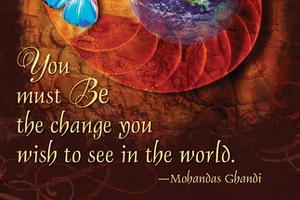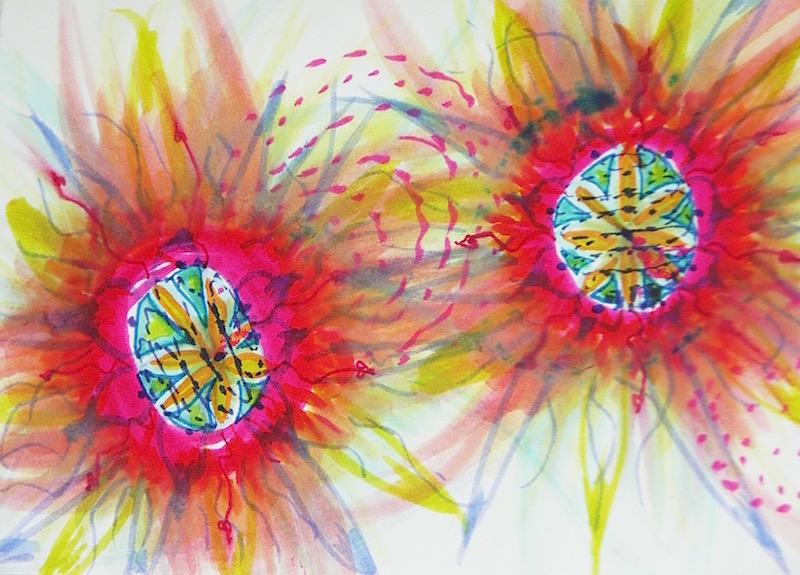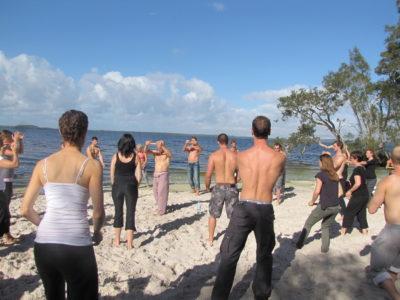Practice Accountability For Authentic Happiness
by Vidya McNeill


Artist credit: Gaelyn Larrick
We hear a lot about change these days.
Since this is the one constant in the universe we can find that there is lots of resistance to what we think we should be, do or become. Even when my willingness factor is a “10+”, it’s not always easy to keep my life stress-free and my activities in balance between my personal and professional life.
The love I feel for life is constantly energizing me onward, and for someone like me who is especially curious and abundantly creative, I can go in a lot of directions – there is so much to discover and do! Walking my talk, I like to think I do well, but honestly I could do better, there is always room for improvement. It’s easy to let distractions become excuses rather than taking ownership when things get delayed or don’t get done in a timely way.
Paul Chek teaches us that Dr. Happiness sets our rhythms, which means I am responsible for establishing the parameters of my day that optimize conditions setting my pressure and flow. These include identifying the best times for me to eat, rest, study, workout and work-in, spend time in nature, connect with loved ones and make the contributions through my work that I intend and have committed to each day. Only I can determine this. My key biological rhythms contribute to and support my tangible feelings of happiness when they are in balance.
As co-creative beings, we are always in a state of becoming; what we experience is directly related to our choices. Cooperating with our natural rhythms supports a sense of ease and wellbeing. Living to my fullest potential means that “I am all in!” and therefore, I am responsible for my choices and accountable for what I tell others and myself what I say I’ll do. Being impeccable with word and deed is an art requiring persistent awareness.
We all have a tendency toward mental or cognitive biases. These biases tend to search for, interpret, focus on and remember information in a way that confirms one’s preconceptions – positive or negative. We notice that our first reactions to stress are often negative and we would just as easily pass off responsibility to someone else to pick up the slack. It’s easy to fall into habitual patterns of blaming others – and as humans, we are really good at pointing fingers, whining and feeling entitled; we do it in our families, at our jobs, on our teams, with our clients. We want everybody else to practice personal accountability and rescue us from our own bad choices. Obviously, we can’t achieve our full potential until we stop blaming each other, and start practicing the art of asking the right questions that encourage accountability.
Accountable thinking is not a skill we are naturally born with. It must be developed. We are each accountable for our own self-management and when we point the finger at others without asking ourselves, “What is my part in the problem? What action can I take to own the situation? What could I have done differently? How can I improve? What can I do more effectively? How can I show up with more grace, presence and joy that will make a positive contribution?” we miss the opportunity to learn from our mistakes, grow and transform, and become a person who is authentic.
It’s always easier to see the gaps of integrity in other people. Integrity leads me to these questions: “How can I better practice the principles I espouse? Does what I say to my clients match what I say or do at home? What can I do to support others? How can I help?” Modeling is the most powerful of all teachers…. Who is watching you?
[dt_quote type=”blockquote” font_size=”big” background=”plain”]“The bigger the gap between the story you tell yourself and the story you tell others the greater the likelihood of the disease.”
–Ken Wilber[/dt_quote]
Often we think it’s the people or situations in life that are the source of our problems… but they are only the trigger events. We either react or respond to stress. The stress that we feel and the coping strategies we habitually fall into is also a result of our programming and choices. It’s easy to feel like we have no control and ask, “why me?” This question contains the tone that communicates victimhood.
As a coach and therapist, this is the common language of my clients when we begin working together. They are trying to make sense of their painful life experiences. Often they are stuck, knowing that something needs to change, but usually with fingers pointing to the trigger events, which freezes them toward inaction, procrastination or maladaptive actions.
It can be tough to take personal responsibility, especially when there is an overload of stress and pain, you’re dealing with a disease process, lack energy and are in the midst of trying out new thinking and behaviors in favor of change and transformation. Many of the challenges my clients face being accountable for their personal choices, behaviors, goals and outcomes requires teaching them the practice of accountability (including boundary setting) while providing healthy doses of empathy and compassion for their struggles as they learn new skills.
[dt_quote type=”blockquote” font_size=”big” background=”plain”]“When we fail to set boundaries and hold people accountable, we feel used and mistreated. This is why we sometimes attack who they are, which is far more hurtful than addressing a behavior or a choice.”
―Brené Brown[/dt_quote]
I know I can’t change other people or control external circumstances or events. The only things I have control over are my thoughts and actions. Asking questions focusing my actions on what I can do helps to make me significantly happier and more effective. It’s a way of living that you can learn too.
The practice of accountability has several components:
- Notice your mental biases.
- Stop complaining, blaming and procrastinating.
- Take ownership of the situation or problem by asking a question that includes the personal pronoun “I.”
- Ask questions that start with “What” or “How” (not why, when or who).
- All questions focus on action, i.e. “What can I do?” “How can I serve?”
- Take action.
Ultimately, the questions that you ask will make a difference in the quality of your life and help you to be more authentic, happier and more endearing to others. Choose wisely and be that change.
I’d love to hear about your changes as you apply this strategy in taking ownership for your own happiness!


